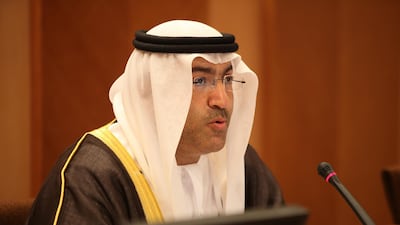A public database allowing patients to access the career history of doctors could be introduced in the UAE, the Minister of Health has confirmed.
Abdulrahman Al Owais, the Minister of Health and Prevention, told a meeting of the Federal National Council (FNC) on Wednesday that discussions on a system allowing the public to access the backgrounds of doctors licensed to practice in the country were already underway.
The minister made the admission after council members called for greater transparency in the medical field, to allow patients to make informed decisions over treatment.
Hamad Al Rahoomi, a council member representing Dubai, said information on any disciplinary action taken against doctors in the past should be made available.
“If the doctor committed a violation and was suspended or got his license taken away at some point, it is the right of the patient to know,” said Mr Al Rahoomi.
“And if the doctor won an award for an achievement, I also need to know, because as a patient this would help me choose between doctors.”
Mr Al Rahoomi was asking the UAE Minister of Health what measures are being taken to drive up standards in the industry.
“We need a database that includes the background of the doctor, his experience and any information, whether positive or negative that would affect a decision to visit a certain doctor,” he said.
He said the information in the database should be provided by the Ministry of Health to ensure it is accurate.
“The doctor could put all kinds of degrees and certificates on his profile, but we want to see the certificates that have been accredited by the UAE.
“And he wouldn’t put negative information about himself,” said Mr Al Rahoomi.
He said the database should be available on a website for any person to access.
“For instance, before anyone is recruited for a job, the employer checks their career history, but I can’t go to a doctor and ask him where he graduated from and which year.
“I am putting in the doctor’s hands my life and my health – the most precious thing I own.”
The proposed database should cover every doctor in the emirates, whether they work for public or private hospitals, the council member said.
Dr Amal Al Qubaisi, chairwoman of the FNC, agreed that such a database was necessary.
“Considering the technologies and advancement we have, there should be such a database containing that kind of information.”
Minister Al Owais told the FNC that the ministry was already looking into introducing such a system.
The council debated whether they should add the database proposal to a medicine draft law they were due to discuss with the minister during the session, or whether they should raise it in an official recommendation to the cabinet.
The minister said it wouldn’t be feasible to add it to the draft law at such short notice.
“I prefer that it gets raised as a recommendation. I know the minister needs to go back to local health authorities and the private sector to liaise with them, I raised the idea and I leave it to the ministry to implement how they see it fit,” said Mr Al Rahoomi.
At the end of the session, the council passed the new draft law to regulate the practice of medicine.
The law allows for anyone who practices medicine without a license to be jailed and face a fine of up to Dh2 million.


